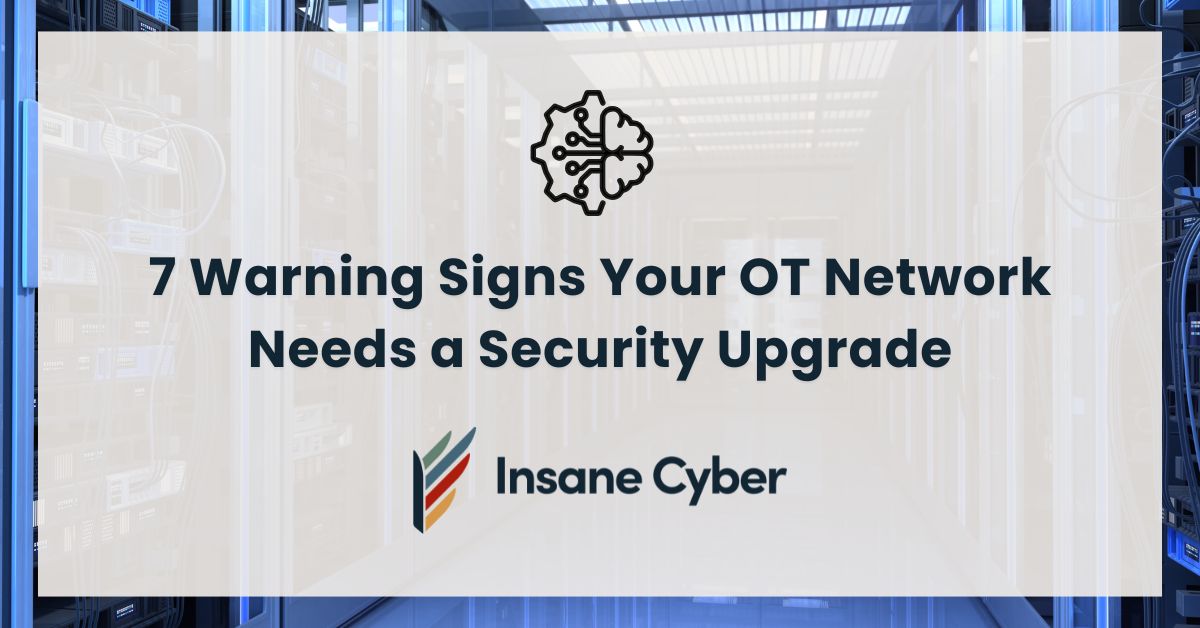Why OT Security Can’t Be Overlooked Anymore
Operational Technology (OT) systems are the foundation of industries like manufacturing, energy, and logistics. As these sectors become more connected, they also become more exposed to digital threats. A security breach in an OT environment isn’t just an IT problem—it can halt production, compromise safety, and even damage infrastructure.
Many OT systems were built long before cybersecurity became a priority. This outdated design leaves critical operations vulnerable. In today’s threat landscape, the question isn’t if your network might be targeted, but when. Identifying weak points early is key to staying secure.
Here are seven telltale signs that your OT environment may be due for a security upgrade:
1. Outdated Technology Still in Use
If your operations still rely on legacy industrial control systems (ICS), they may not support modern security practices. Watch for:
Systems that lack native security capabilities
Tools or platforms that can’t integrate with current cybersecurity solutions
Known security flaws that haven’t been patched
Using aging infrastructure without strong protection makes your network a soft target.
2. Regular, Unexpected Downtime
Frequent system outages could signal more than just technical issues—they might indicate an underlying security problem. Possible red flags include:
Performance drops caused by malware
Intermittent disruptions linked to unauthorized access
Attacks that overload devices with traffic (e.g., DDoS)
If outages happen alongside unusual network behavior, it’s time to investigate further.
3. Parts of Your Network Go Unwatched
OT environments are often complex and fragmented, leaving sections of the network invisible to your security team. Risk indicators include:
Lack of insight into device connections or traffic patterns
No log data available for review or auditing
Limited or outdated monitoring tools
Better visibility through network segmentation and active monitoring is essential for detecting intrusions early.
4. Remote Access Isn’t Properly Secured
Remote connectivity is often necessary for OT teams—but if poorly managed, it’s a major attack vector. Risk signs:
Default credentials are still being used
Data is transmitted without encryption
Remote access protocols like RDP are left unprotected
To safeguard remote access, use encrypted tunnels (like VPNs), enforce multi-factor authentication, and regularly audit permissions.
5. Security Updates Are Rare or Inconsistent
Attackers frequently exploit known software flaws. If your network’s patching process is weak, it opens the door to intrusions. Symptoms include:
Infrequent system updates
Uncertainty about which assets need patching
Reliance on unsupported or obsolete software
A proactive update strategy is vital for minimizing known vulnerabilities.
6. No Game Plan for a Cyber Incident
Without a clear response strategy, even a small breach can spiral into a major crisis. Signs of an unprepared team:
Delays in identifying or containing threats
Disorganized or reactive recovery steps
Higher downtime and potential business losses
Build and regularly test an incident response plan tailored to OT operations.
7. Strange Behavior in the Network
Unexplained changes or activity could mean an attack is already in progress. Warning signs include:
Traffic spikes with no clear cause
Unexpected modifications to device settings
Unknown systems appearing on the network
Advanced detection tools designed for OT environments can help catch these anomalies before serious damage occurs.
Strengthening OT Network Security: Next Steps
If any of these red flags sound familiar, it’s time to take action:
Perform a thorough audit to identify gaps
Use segmentation to isolate critical systems
Introduce tools for continuous monitoring and alerting
Ensure staff across OT and IT are trained in security awareness
Explore intelligent threat detection technologies to stay ahead of evolving risks
Don’t Wait for a Breach to Take Action
Cyber threats targeting OT environments are real, rising, and potentially catastrophic. Strengthening your network’s defenses today ensures the resilience, safety, and efficiency of your operations tomorrow.
Need expert insight? We’re here to help assess your OT security posture and build a roadmap for lasting protection.






